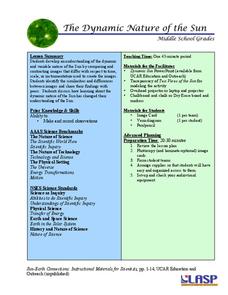Curated OER
Solar Flip Book
Students view and discuss various images of solar events. They research and create a flip book demonstrating the progression of two solar events, and write a poem describing their chosen solar event.
Scholastic
Lesson Three: The Earth, Movement in Space
If you feel like you're standing still, you're wrong! The Earth is constantly rotating and orbiting under our feet. Demonstrate the Earth's movement within the solar system with a collaborative activity. With a candle or lamp in the...
Curated OER
Space Science: Phases of the Moon
Looking for a terrific lesson on the phases of the moon that has lots of good worksheets? With two excellent websites are embedded in the plan, the activity is sure to spark some interest in your astronomy unit. Some common...
Journey Through the Universe
Going through a Phase
Ignore the full moon, it's just a phase. Young scholars observe and record the moon during a full cycle before learning to predict future phases. Then the instructor leads a discussion on the other solar system objects that...
Curated OER
Computer Activity-The Sun
In this computer activity worksheet, students visit a website and take a Virtual Tour of the Sun. While navigating through the site, they complete 16 fill in the blank questions.
Curated OER
Eclipses
For this eclipses worksheet, students read about solar and lunar eclipses to complete 8 short answer questions comparing the two types of eclipses.
Curated OER
Look on the Bright Side!
Young scholars explore solar eclipses by participating in a number of hands-on activities. In class, students work in teams using tennis balls, grapes and flashlights to model partial and total solar eclipses.
Curated OER
Spinning into Space
Students, through hands-on activities, teacher demonstrations, pictures, and informational books, complete a unit on the Earth and its place in the Universe. They make mobiles of the Milky Way and watch demonstrations of lunar and solar...
Curated OER
Solar Car Series: During what part of the day can t most Sun power be collected?
Students participate in an outdoor activity in which they make direct but safe observations of the Sun. Students use a solar cell and voltmeter apparatus to collect data on the amount of DC voltage produced by the solar cell during a...
Curated OER
Eclipse: An Introduction
Students write journal entries about eclipses with a focus on solar eclipses.
Curated OER
Clip the Face
Middle schoolers discover the moon's phases and the rarity of eclipses. For this lunar lesson, students view a video titled Spin Around the Solar System: A Moon Dance, which demonstrates the key differences between a lunar and solar...
Keep it Simple Science
The Earth in Space
Skim the surface of the earth with this brief, compact, summary of outer space. The sun, stars, galaxies, planets, and phases of the moon can be found in this all-in-one resource. Seventh graders will enjoy these simple worksheets to do...
University of Texas
Observing the Moon
Why does it look like there is a man on the moon? Why does the moon look different every night? These are the focus questions of a lesson that prompts class members to observe and record the nightly changes of Earth's natural...
Curated OER
Why Do We Have Night?
Young scholars engage in a fun, creative way to discover how the Earth moves. This lesson helps students explain why there is day and night. It can also create curiosity to further study the solar system and eclipses!
Curated OER
A Moon with a View
Third graders explore the rotation of Earth and the moon. In this solar system lesson, 3rd graders participate in an Earth and moon simulation in which part of the class "becomes" the sun, while other children represent the moon by...
Curated OER
Moon Phases
In this moon activity, students fill in the different phases on the moon on a diagram and label each phase. Students compare a solar and lunar eclipse. This activity has 2 fill in the blank and 3 short answer questions.
Journey Through the Universe
How Far is Far?
The earth only revolves around one thing — and it's not any of your pupils. The lesson includes two activities dealing with the distance to the sun and the moon. First, scholars create a pin hole camera and use the rules of similar...
Big Kid Science
Measuring Shadows Using an Ancient Method
How did ancient peoples determine the height of really tall objects? Young scientists and mathematicians explore the concept of using shadows to measure height in a hands-on experiment. Paired pupils measure shadows, then calculate the...
PHET
The Dynamic Nature of the Sun
In this second lesson of the series, pupils learn to observe similarities and differences in photos of the sun and record them in a Venn diagram. Then, small groups practice the same skill on unique images before presenting their...
Columbus City Schools
Moon Phase Mania
Now you see it, now you don't. Our moon seems to pull a disappearing act from time to time—but why? Take your seventh grade scientists above and beyond to discover the truth about the moon and the role it plays in Earth's little...
Curated OER
The Reasons for the Season
Students explain the reason for the changes in season. In this lesson plan examining the relationship between the Earth and the Sun, students use an applet to discover how the alignment of the Earth and the Sun cause the change in...
Curated OER
Sun Activity
In this space science worksheet, young scholars find the answers to the questions concerning the topic of the sun and they label the diagram for the sun.
Curated OER
"Space" Investigations
Sixth graders understand the patterns of change observable on Earth as a result of the movement of the different bodies in the solar system. They identify the physical characteristics of the different components of the solar system.
Curated OER
Watch This Space!
In this space learning exercise, students, with a partner, answer five questions about the universe and read and discuss ten questions regarding astronomy.

























